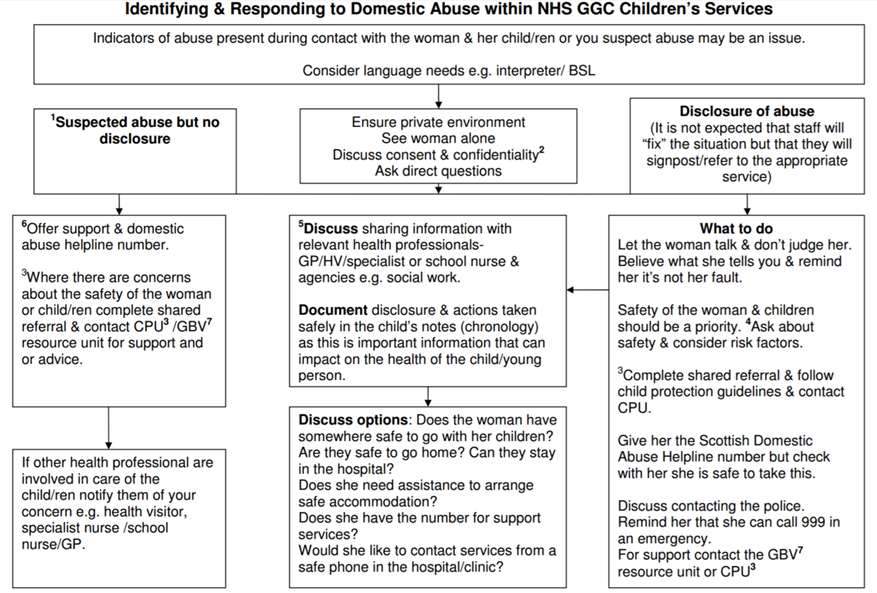Domestic abuse, identifying and responding to within NHSGGC Children's Services
exp date isn't null, but text field is
Objectives
Describe the indicators of domestic abuse in an adult, child or young person. along with a pathway for responding to a concern
Scope
Adults, children and young people who are accessing healthcare services within GG&C Children's services
Audience
All healthcare staff working with GG&C Children's services

Click here to download a pdf version of the Domestic Abuse Pathway
Notes to accompany the pathway are listed below.
Given the prevalence statistics this pathway assumes the victim is female however, it can also be used for men experiencing domestic abuse.
- Injuries at different stages of healing, delay in seeking treatment
- Appears evasive, socially withdrawn & is hesitant
- Missed appointments
- Partner or relative answers for her
- Depression/anxiety
- Panic attacks
- Alcohol or drugs misuse
- Direct injury or harm
- Signs of distress, emotional disturbance or behavioural difficulties
- Failure to thrive
- Bed wetting
- On child protection register
- Withdrawn
- Poor school attendance
- Low self esteem/low self confidence
- Substance misuse
- Self harm
Be aware that these lists are not exhaustive & that there may be other causes, also that some women & children show no signs or indicators.
If you cannot see the woman alone do not ask about domestic abuse as this could put her at greater risk.
- Abuse suspected but not disclosed- there will be times when you suspect abuse but the woman denies it, in these circumstances respect her response & be aware that she may come back to you at a later date and disclose. Share this concern with other health professionals who will be involved in the care of the family.
- Confidentiality- it is important to emphasise confidentiality but also to be clear about its limits. Explain this to the woman let her know that where there are concerns over safety of children/young people this will be shared with appropriate agencies.
- Child protection- Any concerns re child/young person complete shared referral & follow guidelines. Seek support from the Child Protection Unit: 0141 451 6605 or speak to your manager.
- Asking about risk/safety- is she worried about the safety of herself or the children? Are you worried about the safety of the woman or children? Are there any drug or alcohol problems? Does she require a place of safety? If yes to any of these make a shared referral. Be aware that leaving an abusive relationship increases risk and do not disclose place of safety or forwarding address to partner or family. Discuss contacting the police or calling 999 in an emergency. Advise packing an emergency bag and keeping it in a safe place, include clothes, documents, keys, money, toys, passports, medication, contact number for domestic abuse helpline.
- Sharing Information- disclosure of abuse is important health information. Staff should share this information with relevant health professionals e.g. GP, Health Visitor, specialist nurse, school nurse.
- Support Services:
Scottish Domestic Abuse helpline 0800 027 1234 24hr service for women, men & children.
Men’s Advice Line 0808 801 0327 for male survivors of domestic abuse.
Hemat Gryffe Women’s Aid for black & minority ethnic women & where there are issues of forced marriage 0141 353 0859.
Childline 0800 11 11. - For support call the Gender Based Violence Resource Unit (GVBRU) on 0141 201 (1) 9777 or email: gbvunit@ggc.scot.nhs.uk Mon-Fri 9am-5pm
The GBVRU is not a referral service & does not work directly with women & children, the service is there to support staff that are supporting families who are or have experienced abuse.
Last reviewed: 01 February 2017
Next review: 30 November 2021
Author(s): Kerry Milligan

